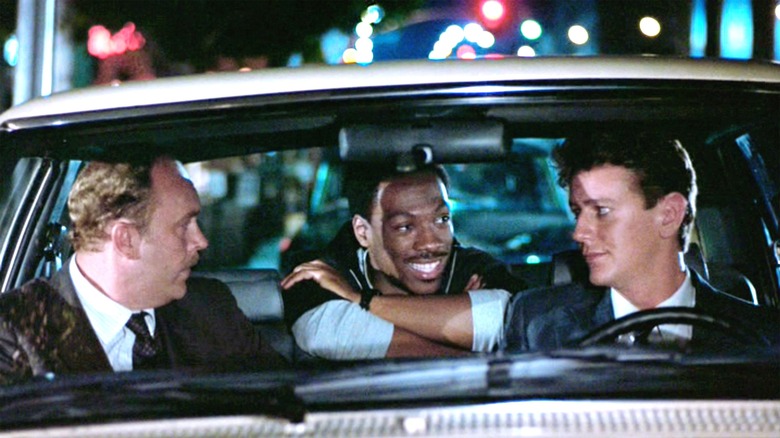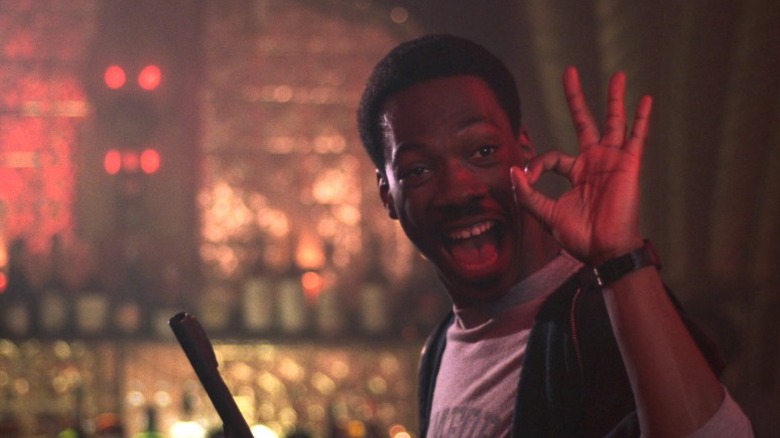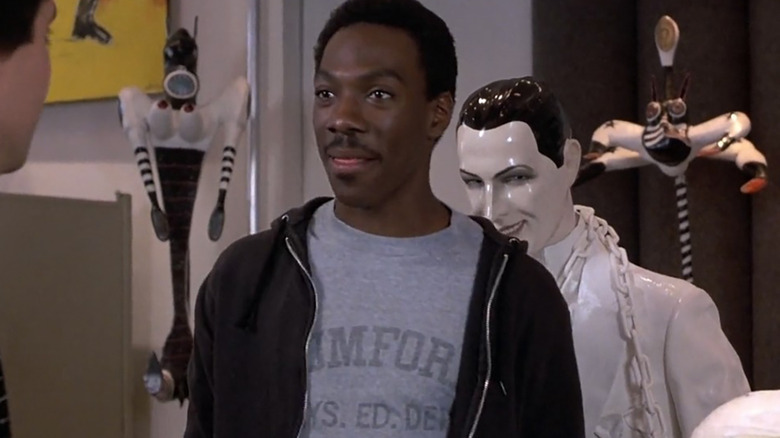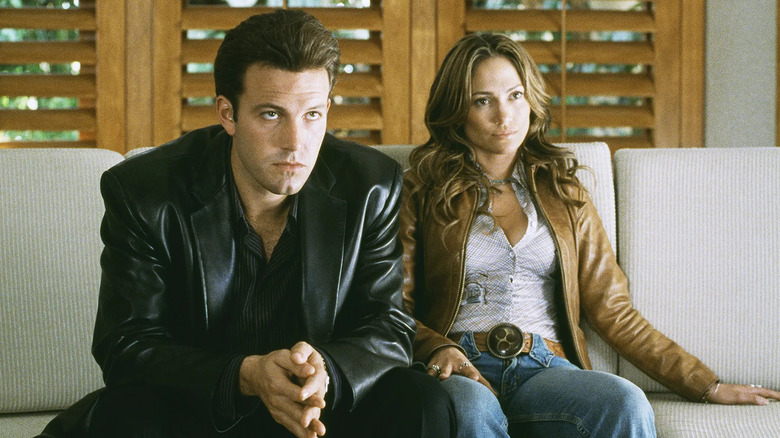Choosing A Director For Beverly Hills Cop Came Down To A Coin Flip
Like Eddie Murphy's dogged detective character Axel Foley, the concept for "Beverly Hills Cop" just wouldn't go away. A 1975 Hollywood traffic stop for then-Paramount Pictures president Michael Eisner, out of place driving a station wagon, inspired the idea for the movie. By the time "Beverly Hills Cop" was finally produced in 1984, Paramount had spent nearly a decade and two million dollars developing the film.
When production was set to begin, Paramount ran into some problems — specifically, it didn't have a star or a director. Sylvester Stallone, initially slated to play Axel Foley, stepped away over disagreements about the tone of the film. (He later put many of his ideas for his version of "Beverly Hills Cop" into the 1986 action film "Cobra.") Producer Jerry Bruckheimer had his heart set on up-and-coming director Martin Brest, who had his own reservations. They soon found the perfect replacement for Stallone in Eddie Murphy, but convincing Brest to direct the film proved to be more of a challenge.
"Beverly Hills Cop" became an enduring franchise with three films (and a fourth on the way), well worth the investment from Paramount. But for the opening salvo of the franchise, the gamble to acquire their director turned out to be a literal coin flip.
'It came up heads, so I said I'd do it'
"Beverly Hills Cop" may have cemented Eddie Murphy as a Hollywood A-lister, but the same can't be said for its director. The career of director Martin Brest is quite peculiar. He caught Hollywood's attention in 1977 with the artsy film "Hot Tomorrows" and received high praise for his 1979 sophomore feature, "Going in Style." But then Brest was fired from "War Games" after two weeks of production.
When the opportunity to direct "Beverly Hills Cop" came along the following year, he was hesitant. Brest told The New York Times the whiplash of his previous experiences left him "gun-shy." The director said:
”Suddenly everybody said there must be something wrong with me. The wunderkind had fallen. I was scared. My next film could have been my last. I wanted to make sure that the next job I took would be absolutely brilliant. So I kept declining."
But like a nagging detective from Detroit, Paramount producer Jerry Bruckheimer was unrelenting in his pursuit of Brest. Finally, to appease Bruckheimer, the director agreed to flip a coin to determine the outcome. Heads? Brest would direct the movie. Tails? Bruckheimer would finally stop pestering him and leave him alone. ”I was scared to look,” Brest said, recalling the coin flip. ”But I had made a firm commitment to adhere by the outcome. It came up heads, so I said I'd do it.”
And once Brest finally agreed to direct, that choice had a ripple effect that included "Beverly Hills Cop" becoming one of the top films of 1985.
Brest encouraged Murphy to improvise his lines
The behind-the-scenes developmental chaos of "Beverly Hills Cop" meant last-minute changes and rewrites to the point that the script was still being revised after production on the film began. To help deal with the disarray, Brest encouraged Murphy to improvise throughout the film. The director discussed Murphy's improv skills, saying:
”It's spooky but every time we got into a jam, I'd turn to Eddie and say, 'Can you come up with something?' And every time, he came up with something that knocked me to the floor. He's a director's dream."
Even Axel Foley's iconic look was largely inspired by Murphy, at the encouragement of Brest. Murphy rejected his character's initial wardrobe, deeming it too slick. ”It was important that Foley was totally unassisted by anything material,” Brest said. ”That's why he has a junky gun, a junky car. He's almost a zen character. All he has are his wit, intelligence, humor, guts, and street smarts."
And that Mumford High School shirt worn by Foley? According to The New York Times, producers stumbled across the school while researching police procedures in the field. They joined detectives investigating a murder in Detroit and noticed the school near the crime scene. The school unwittingly became part of "Beverly Hills Cop" canon and a Halloween costume staple for decades.
Brest's curious career
Brest's decisions to direct "Beverly Hills Cop" and give Murphy a wide berth of artistic freedom proved wise. The movie grossed more than $316 million worldwide, and at the time it was Paramount Pictures' highest-grossing winter release.
"Beverly Hills Cop" got Brest back in the game after his firing from "War Games," but it would be another four years before his next film, the action comedy "Midnight Run." After that, another four years elapsed before his next directorial effort, "Scent of a Woman." Brest never appeared to be in a big rush for his next film, something filmmaker and colleague Paul Thomas Anderson joked about Brest's schedule at a Q&A last year celebrating Brest's career. Anderson said:
"Like Stanley Kubrick, we always have to wait seven years before the next Marty Brest movie. They take forever and ever and ever, and we wait and wait and wait."
After "Meet Joe Black" in 1998, Brest would end his directing career with an unmitigated disaster. In 2003, he wrote and directed the critically panned "Gigli." The film made The Hollywood Reporter's Worst Movies of All Time list, boasts a 6% rating on Rotten Tomatoes, and swept the Razzies in 2004. And as quick as a coin flip, Brest disappeared from Hollywood.



